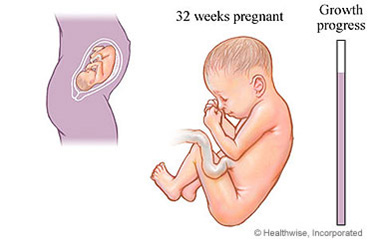Weeks 30 to 32 of Your Pregnancy

You have made it to the final months of your pregnancy. By now, your baby is really starting to look like a baby, with hair and plump skin. He or she probably weighs 3 to 4 pounds and is about 16 to 17 inches long. With little room to move, your baby may be rolling over less and kicking more.
As you enter the final weeks of pregnancy, the reality of having a baby may start to hit you. This is the time to settle on a name, get your household in order, set up a safe nursery, and find quality child care if needed. Doing these things in advance will allow you to focus on caring for and enjoying your new baby. You may also want to have a tour of your labor and delivery unit to get a better idea of what to expect while you are in the hospital. Now would also be a good time to pre-register for your hospital admission.
At your next visit, usually in your 36th week, you will be tested for Group B Streptococcus (GBS). GBS is a common bacteria that can live in the vagina and rectum. It can make your baby sick after birth. If you test positive, you will get antibiotics during labor to keep your baby from getting the bacteria.
During these last months, it is very important to take good care of yourself and pay attention to what your body needs. If your doctor says it is okay for you to work, take it easy. If you feel sexual, explore ways to be close with your partner that match your comfort and desire. Use the tips provided in other care sheets to ease leg cramps and sleep problems, and follow the tips in this care sheet to ease heartburn, varicose veins, hemorrhoids, and low back pain.
Follow-up care is a key part of your treatment and safety. Be sure to make and go to all appointments, and call your doctor if you are having problems. It’s also a good idea to know your test results and keep a list of the medicines you take.
How can you care for yourself at home?
Take it easy at work
- Take frequent breaks. If possible, stop working when you are tired, and rest during your lunch hour.
- Take bathroom breaks every 2 hours.
- Change positions often. If you sit for long periods, stand up and walk around.
- When you stand for a long time, keep one foot on a low stool with your knee bent. After standing a lot, sit with your feet up.
- Avoid fumes, chemicals, and tobacco smoke.
Ease heartburn
- Eat small, frequent meals.
- Do not eat chocolate, peppermint, or very spicy foods. Avoid drinks with caffeine, such as coffee, tea, sodas.
- Avoid bending over or lying down after meals.
- Talk a short walk after you eat.
- If heartburn is a problem at night, do not eat for 2 hours before bedtime.
- Take antacids like Mylanta, Maalox, Rolaids, or Tums. Do not take antacids that have sodium bicarbonate.
Care for varicose veins
- Varicose veins are blood vessels that stretch out with the extra blood during pregnancy. Your legs may ache or throb. Most varicose veins will go away after the birth.
- Avoid standing for long periods of time. Sit with your legs crossed at the ankles, not the knees.
- Sit with your feet propped up.
- Avoid tight clothing or stockings. Wear support hose.
- Exercise regularly. Try walking for at least 30 minutes a day.
Ease hemorrhoids
- Keep stools soft by increasing liquids, fruits, vegetables, and fiber in your diet.
- Avoid sitting for long periods of time. Lie on your left side several times a day.
- Cleanse with soft, moist toilet paper, witch hazel pads, or personal hygiene pads.
- Try ice packs to relieve discomfort, or sit in a warm sitz bath for 20 minutes, several times a day.
- Use hydrocortisone cream (Preparation H Hydrocortisone, Anusol) to relieve pain and itching.
- Ask your doctor about taking an over-the-counter stool softener.
Ease low back pain
- Lift using your legs instead of your back. Squat instead of bending at your waist.
- Wear low-heeled, supportive shoes.
- Roll to your side before you sit up from lying down.
- Apply heat or cold to your back. Ask your partner for a nightly back rub.
- Use a firm sleeping surface. A rigid board under your mattress can help.
- Do pelvic tilt exercises to strengthen your low back muscles.
- Attend a water exercise class for pregnancy, or do stretching exercises in a pool.
Be sexual in your own way
- Having sex during pregnancy is okay, unless your doctor tells you not to.
- You may be very interested in sex, or have no interest at all.
- Your growing belly can make it hard to find a good position during intercourse. Experiment and explore.
- You may get cramps in your uterus when your partner touches your breasts.
- A back rub may relieve the backache or cramps that sometimes follow orgasm.

